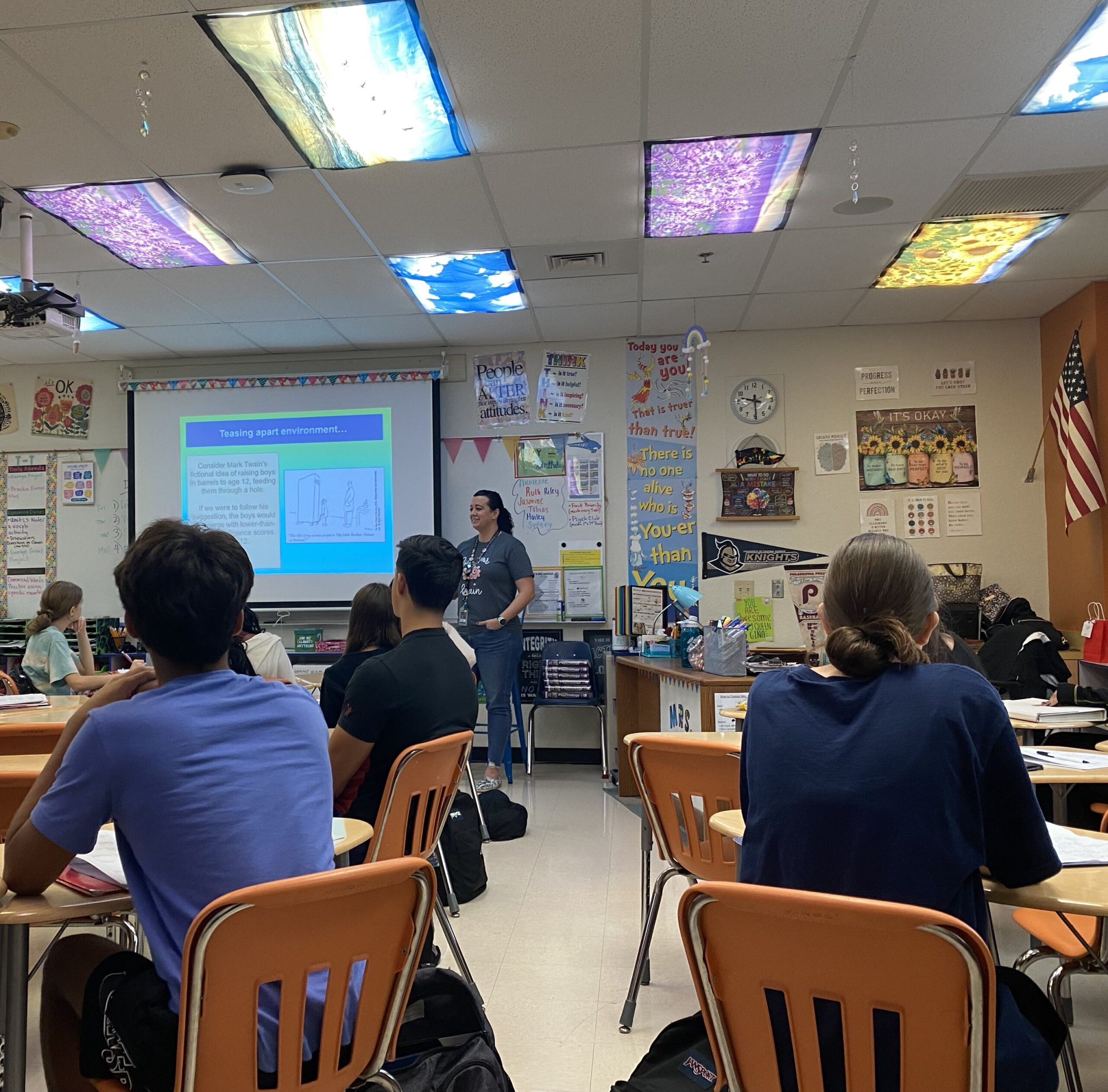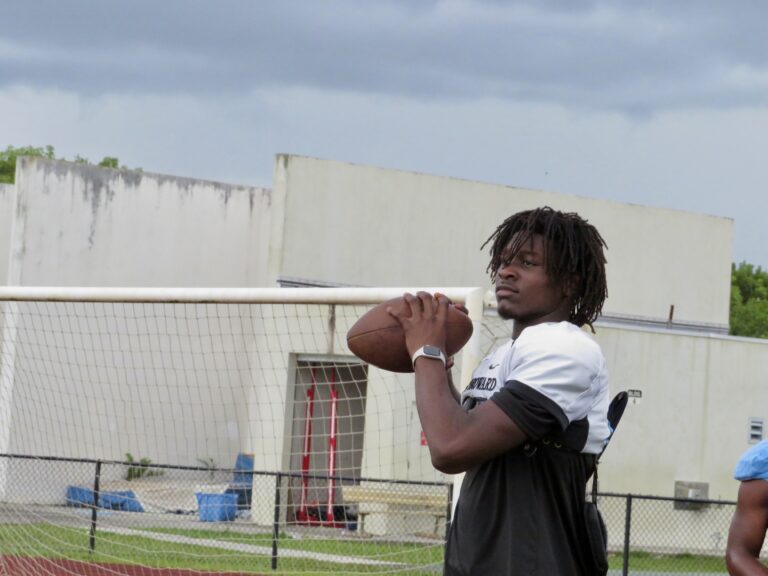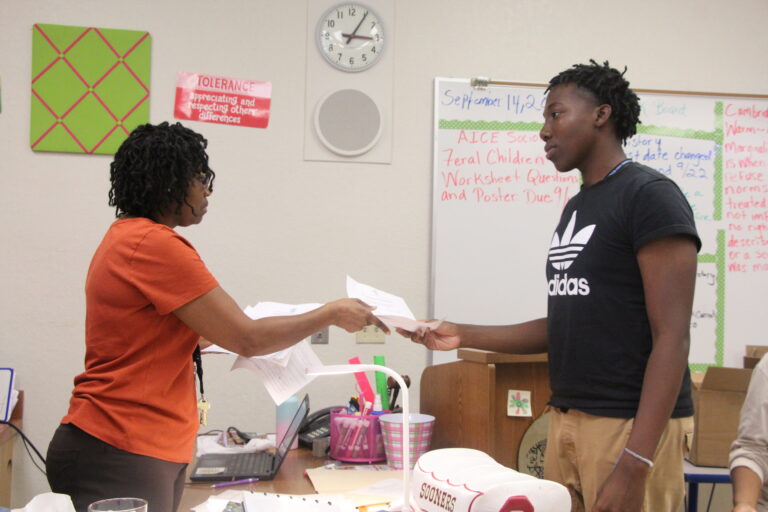
Florida feuds with AP curriculum
MENTAL BLOCK: AP Psychology teacher Gina Cunicelli-Carlton begins an early morning lesson with students. Carlton expressed shock and disappointment with the FDOE’s original announcement in August that banned the course in Florida, “I think it is ridiculous that in high school kids should not be allowed to learn something like that. I am not asking anyone to change their gender or sexual orientation. We are just explaining what the definitions of [gender and sexual orientation] are, not giving an opinion on it.” Photo by Sonaiya Brown
By: Valentina Padula
The right to education, as many students have learned in their history class, is a privilege regulated and maintained by each state in America. Florida has had a national spotlight on its own recent educational policies, which push forth political objectives that not only restrict education, but threaten the teaching of real-world information in schools.
The Florida Department of Education (FDOE) has mulled over a few of College Board’s Advanced Placement (AP) courses this past year. AP Psychology, a class where students delve into the scientific study of human behavior, is the most recent one to be on the chopping block.
The course’s banishment was announced by Fla. officials in August after College Board refused to reevaluate it at the request of the FDOE. However, after hefty backlash from students and educators across the nation, the law was withdrawn a sole week later.
AP Psychology’s restoration seemed to be the only choice for education officials who claimed it violated the “Parental Rights to Education” bill. Panned as the “Don’t Say Gay” bill, this law introduced problematic conservative legislation into the classroom by inhibiting a range of education on sexual orientation or sexual identity. For students looking to learn further about these topics for personal reasons or otherwise, the FDOE has unabashedly pushed them aside.
The possible elimination of the course in Florida immediately stirred an uproar, with even American Psychological Association CEO Arthur Evans Jr. applauding College Board for “standing up to the state of Florida and its unconscionable demand to censor an educational curriculum.”
AP Psych is equivalent to an introductory psychology class in college, and it allows students to get an early start to a post-high school education. If it had stayed banned, nearly 28,000 annual Fla. students would miss out on opportunities to both earn college credit and gain knowledge on a course that provides applicable information for almost any major.
This is not the first time College Board has been challenged by Florida, though. Their most recently proposed AP African American Studies (APAAS) faced a wave of rejection from education officials back in January. The stand-out difference between these two disputes was the permanent and absolute prohibition of APAAS in any Fla. classroom.
The FDOE’s prompt shutdown of APAAS is a demonstration of how Florida is attempting to silence the truth of history. Their claim that the course “significantly lacks educational value” is blatantly incorrect.
Students have a right to be educated on all aspects of racial history, especially the ugly. Censoring these facts promotes ignorance and encourages misinformation. Students should be forced to acknowledge the uncomfortable parts of history instead of being blinded to them.
Through their eyes, the FDOE does have probable cause to question the “learning objective” of these courses. In February 2022, Fla. Governor Ron DeSantis passed the “Stop W.O.K.E. Act,” which restricted discussion on early America’s racial dynamics and social oppression. Critical Race Theory, a concept in APAAS, was one of the many topics evaluated as too “woke”.
Both APAAS and AP Psych are classes that are specifically chosen by students because of personal interest and benefit. For Fla. officials to not only limit, but entirely ban these classes, is a blatant declaration of disregard for students that want to gain real-world education and is a further push for a political agenda against modern inclusivity.
With Florida beginning to incorporate conservative influence into education, other states may soon follow. Race and sexuality are societal issues that are evaluated constantly at a political and moral level. For students entering adulthood, it is important to determine personal conclusions on these topics based on unbiased facts. Having limited education across the country takes away the already significantly fading ability of this current generation to independently form our own opinions.


